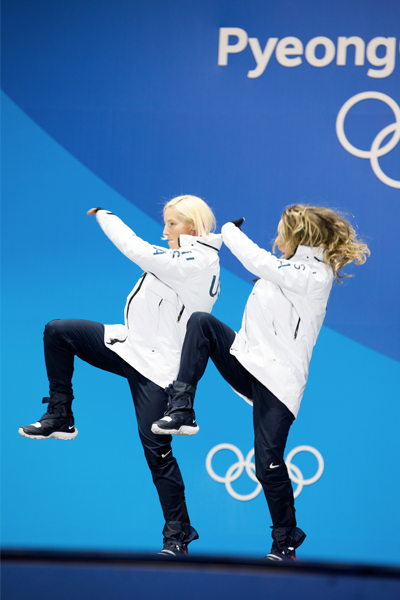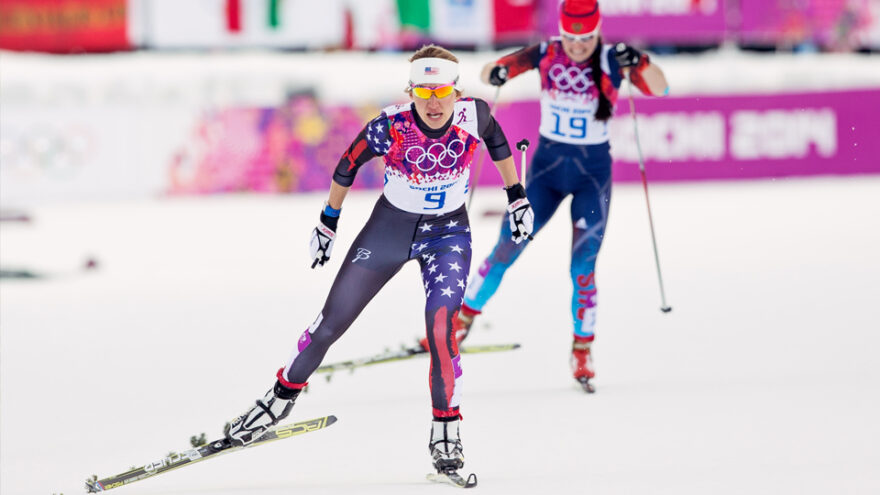Women’s cross-country ski racing has come a long way in the United States in the past 50 years. And for those women striving to compete on the world stage, it’s been a long and complex road of hard work, mental will, and perseverance.
Their stories are told in Trail to Gold: The Journey of 53 Women Skiers, a book about U.S. Olympians written and published by the women themselves, with Sue Long Wemyss ’82 serving as the project leader. The athletes have an extraordinary history to tell. Men had been racing cross-country since the first Winter Olympics in 1924, but the sport was considered too physically demanding for women. Programs for females finally began to arise in the U.S. in the 1960s but were still underscored by hesitation and caution. After careful consideration by race officials, Alison Owen, a talented young skier from Washington State, was allowed to compete in the 1966 Junior National Championships as the one female on her team—but she could only do so if an ambulance was parked race-side in case she needed it.
Still, opportunities for women to compete nationally and internationally were opening up in the ’60s, and in 1972, the United States sent its first women cross-country skiers to the Olympics, in Sapporo, Japan. Five athletes from Alaska, Vermont, and Washington showed up to compete against powerhouse teams from Scandinavia and the Soviet Union, places that had been developing elite women racers for years. The Americans ranged in age from 19 to 27, but they all shared the common passion to compete and win. And their results were respectable—Martha Rockwell even made the top 20 in both the 5K and 10K races. More importantly, however, these Olympians were setting a precedent for future U.S. women Olympians who could look to their successes and strive to live up to them.
With their groundbreaking trip to Sapporo, the U.S. women had proven they could compete at the top international level, and the U.S. continued to send them to the Olympic Games, World Cup Championships, and countless international contests over the next five decades. But finding success on the courses and winning medals was an elusive goal. The skiers endured, as the book states, “disappointments, personal struggle and team politics, a revolving door of coaches, and years of mixed results.” Often, they faced well-financed and well-coached Europeans, many of whom were taking performance-enhancing drugs and doing what they could to win. Trina Hosmer, a member of the 1972 Olympic team, recalls a World Championship race in Prague, where she lined up to do the first leg of a relay surrounded by “fierce-looking competitors.” As the gun sounded and she took off, she heard “hup” behind her and a Bulgarian racer proceeded to push her out of the way and into a ditch to get by. She was so shocked all she could do was yell, “You can’t do this, it isn’t fair!”
And while the talented American women were esteemed in the United States skiing circle, their status as U.S. skiers was seen through a different lens in Europe. Nancy Fiddler, a 1988 and 1992 Olympian, recalls an embarrassing moment racing in Holmenkollen, near Oslo, when she passed a group of Norwegian spectators and some boisterous children began singing, “USA, ha, ha, ha, USA, ha, ha, ha.” She says, “I was also treated to a rendition of ‘Old MacDonald Had a Farm’ that day.” Sometimes, when demoralized about the reputation of the U.S. team, the skiers found it difficult to keep going.
Yet despite the ups and downs of morale and race results in the three decades after 1972, the women did persevere and consequently paved the way for incoming talent, such as a young and committed Kikkan Randall, who first raced on the U.S. team in 2000. Although it took years, she worked her way into the top tier of international racing, and as the world watched, she began finding results never seen before in the history of the sport. Her successes started a new momentum and gave women skiers in the U.S. hope.

And indeed, the trip to the podium for a medal finally happened in 2018. Kikkan Randall and Jessie Diggins brought home the gold in the Pyeongchang Olympics, winning the team sprint.
Trail to Gold
In December 2012, Sue Wemyss, a 1984 Olympian, traveled to Quebec City to cheer on the American women in World Cup races. While there, she ran into Kikkan Randall’s parents. Randall, at that point, had already participated in three Winter Olympics, starting in 2002, and was proving to be one of the world’s top sprinters. When her father learned Wemyss was a former U.S. Olympian, he clapped his hands on her shoulders and said, “So these are the shoulders that Kikkan stands on.”
This affirmation, that over the years pathways had been carved by those who went before for those who came after, was also recognized by Matt Whitcomb ’01, the U.S. women’s cross-country coach from 2010 to 2018 and now the U.S. Ski Team cross-country head coach. In 2013, Whitcomb conceived of a team-strengthening project. He asked the women on his team to interview the Olympians who had competed before them. He says, “We realized there was a greater team around us, beyond just the eight women on the U.S. Ski Team. We kept hearing that we were paving the way for the next generation of kids, and it all was going to feel a little empty if we didn’t look into who it was that cut the trail before us.” He felt the interviews could be used to create a book celebrating the history of women’s cross-country skiing in the U.S.
The book idea, however, didn’t gel until several years later when a series of occurrences brought the Olympians together and gave them the chance to bond as a group. Alison Owen Bradley, of the 1972 team, met Kikkan Randall at an Alaskan event. They began to discuss the idea of organizing a reunion of all the women who had participated in the Olympics over the decades. Consequently, in March 2019, when the final World Cup races of the year were being held, the very first reunion of the U.S. Olympic women cross-country skiers was held in Quebec City. It was so successful that another one was planned for 2020 but was cancelled due to COVID.
Sue Wemyss says, “Our group of Olympic women met by Zoom that spring and some of us were interested in producing a book that would commemorate both the achievement of the gold and the fact that 2022 would be the 50th anniversary of the first U.S. team to compete in the Olympics.”
So, a book committee was formed with Wemyss in the lead, and support came from Whitcomb, who turned over the interviews his team had done. Stories were solicited from members of the Olympic group, and the committee decided on the topics and themes they thought would be interesting and important to include. Nancy Fiddler volunteered to try writing the first chapter and ended up writing five. Wemyss wrote two, Betsy Youngman wrote one, and Midd grad Dorcas DenHartog ’87, who participated in the ’88, ’92, and ’94 Olympics, wrote another. Another Midd grad, John Wolfe ’84, copyedited the chapters, created the glossary, and helped write the introductions. Photos were collected and Wemyss found a book designer. The result is a beautiful and compelling history of the hard work, heartbreaks, triumphs, and shared experiences of a sisterhood of competitors.
The book is a solid tribute to a group of women whose aspirations to ski at the most competitive levels and achieve success are inspiring. Their stories recount a history not well known in the United States. But maybe more importantly, the interviews conducted by Whitcomb’s team and the creation of the book may give the 53 women a sense of context and continuity to their individual skiing careers. The importance of their endeavors becomes clear. As the introduction states, “When Jessie Diggins crossed the finish line in the women’s team sprint at Pyeongchang, South Korea, on February 21, 2018, winning Olympic gold with her teammate Kikkan Randall, more than five decades of American women cross-country skiers who had donned international race bibs stood up and cheered.”
While Middlebury has over the years sent several of its student-athletes to the U.S. Ski Team, finding the Midd connections in this particular faction of the U.S. team is fun. Besides Wemyss, DenHartog, and Whitcomb, there’s Terry Porter ’77, a 1976 Olympian, and Beth Paxson ’84, a 1980 Olympian. Patty Ross, who grew up in Middlebury and later worked at the College as an assistant Nordic and track coach, skied for the U.S. at the 1984 Olympics. Even Kikkan Randall has a Midd connection: her proud grandfather, Lew Haines, was a member of the Class of 1943.

Leave a Reply